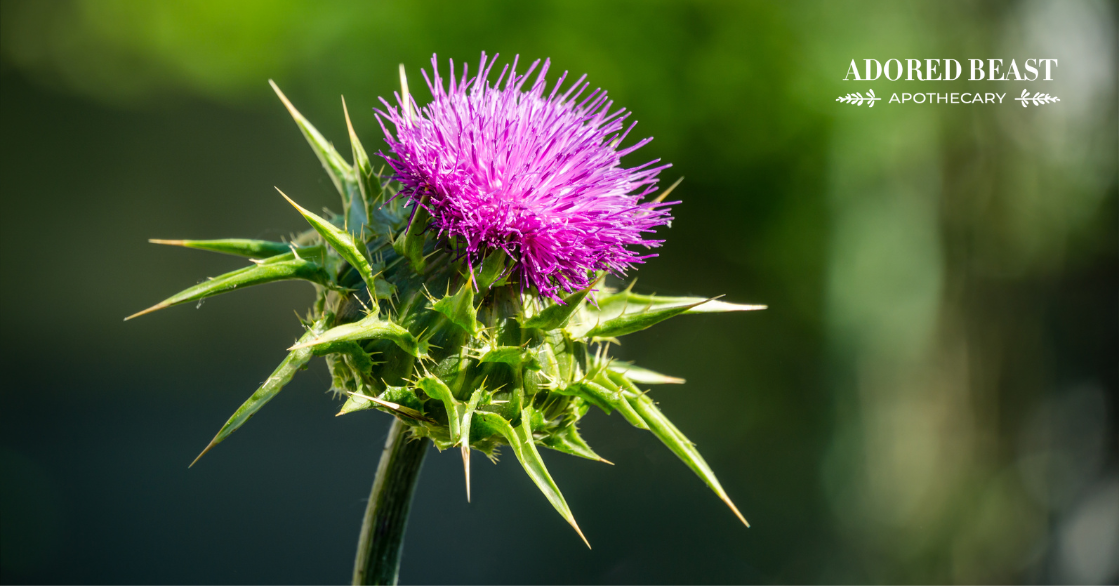When our pets face health challenges, we try to turn to Mother Nature whenever we can to support them. There are so many natural things in that wide world out there that we can use that really boost health.
One of the most well-known herbs for both humans and animals is milk thistle. This gentle yet powerful plant has been used for centuries to support the liver, detoxification, and overall wellness. Let’s talk about the benefits of milk thistle for dogs and cats!
What is Milk Thistle?
Milk thistle (Silybum marianum) is a spiky, purple-flowering plant that belongs to the daisy family. It’s native to the Mediterranean region but now grows widely around the world. While it may look like a common thistle, milk thistle has been treasured for thousands of years as a medicinal herb, used by ancient Greeks and Romans for digestive and liver problems.
The seeds of the plant contain a group of compounds known collectively as silymarin, which is where most of milk thistle’s healing power comes from. Silymarin is a potent antioxidant and anti-inflammatory that helps protect and regenerate cells, especially in the liver. In fact, milk thistle is one of the most researched herbs when it comes to liver health, and it’s used in both human and veterinary medicine.
For pets, milk thistle is considered a “detoxifier” because it helps the liver filter out toxins more effectively and can actually encourage new liver cell growth. This makes it especially valuable for dogs and cats who are dealing with long-term medications, exposure to environmental toxins, or conditions that strain the liver.
Benefits of Milk Thistle for Dogs and Cats
There are several reasons to look to milk thistle for dogs and cats. It’s why it’s a feature in our Liver Tonic (one of our all-time best-sellers).
Here’s why we love it:
1. Liver Support and Detoxification
Milk thistle is often used when a pet’s liver is under stress – whether from illness, toxins, or medications. Silymarin helps regenerate liver cells and protect them from further damage.
It may be helpful for pets with:
- Liver disease or elevated liver enzymes
- Exposure to environmental toxins (such as lawn chemicals)
- Side effects from long-term medications (e.g., seizure meds, steroids, pain medications)
2. Support During Illness or Recovery
Because of its antioxidant properties, milk thistle can help reduce inflammation and oxidative stress in the body. Pets recovering from infections, pancreatitis, or other illnesses may benefit from this extra support.
3. Kidney Health
Milk thistle’s detoxifying effect doesn’t just help the liver – it can also benefit the kidneys. It helps reduce oxidative stress and can support pets with chronic kidney disease when used as part of a holistic plan.
4. Immune System Support
By reducing toxins and inflammation in the body, milk thistle indirectly helps strengthen your pet’s immune system. This is especially important for older pets or those with chronic health conditions.
How to Use it
Unlike some herbs that can be harsh, milk thistle is generally very gentle and well tolerated by both dogs and cats. It’s often recommended as a supportive, natural remedy rather than a cure, working alongside veterinary treatments to promote better overall health.
Milk thistle is available in several forms:
- Tincture (liquid extract): Easy to mix into food; great for cats since they’re often picky.
- Powdered herb or capsules: Can be sprinkled over food.
- Supplements: Many high-quality liver support blends include milk thistle alongside other herbs and nutrients.
While exact dosage can vary based on your pet’s weight, health condition, and the specific product, here are some general guidelines:
- Dogs: 100–200 mg of standardized milk thistle extract (80% silymarin) per 10–20 lbs of body weight, once daily.
- Cats: 50–100 mg of standardized extract (80% silymarin), once daily.
If using a tincture, follow the manufacturer’s dosing instructions – typically around 1–2 drops per pound of body weight, once or twice daily. If using a supplement, find one made for pets specifically, and follow the directions on the label.
⚠️ Important notes:
- Milk thistle is usually safe, but it’s best used as a short-to-medium term supplement, unless your vet recommends ongoing support.
- Always consult your veterinarian before starting milk thistle, especially if your pet is on medication or has a serious condition.
- Look for products specifically formulated for pets or human-grade supplements without additives.
Milk thistle for dogs and cats is a gentle yet effective herbal supplement that can support your pet’s liver, kidneys, and overall wellness. Whether your pet is recovering from illness, on long-term medication, or simply needs a detox boost, milk thistle may be a valuable addition to their health plan.












